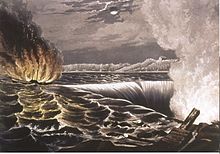Caroline / McLeod affair
The Caroline / McLeod Affair , on the brink of Canada's aspirations for independence from British colonial rule, resulted in a crisis between the United Kingdom and the United States from 1837 to 1840 .
After the rebellions of 1837 (see History of Canada ) had been put down by British troops, William Lyon Mackenzie , one of their leaders in Upper Anglophone Canada , withdrew with a group of rebels to join the Navy in the Niagara River near the border with the United States Iceland and proclaimed the short-lived Republic of Canada there. There was great sympathy for the uprising in the USA and the rebels had used US territory as a place of escape and supply. Even after the retreat to Navy Island, the insurgents were supported by sympathizers from the USA.
On December 29, 1837, the supply ship Caroline , which had also loaded weapons, was captured by the Royal Navy under Captain Andrew Drew and pulled onto Canadian territory. The soldiers set the ship on fire and then let it drift with the oar lashed in the middle of the river, causing it to tumble down Niagara Falls . Up to two Americans - namely one of the rebels with Amos Durfee and a cabin boy - were killed during the boarding . In the United States press, however, there was talk of dozens of Americans drifting helplessly down Niagara Falls on the burning ship. Numerous protests were held.
At the request of the governor of New York , William L. Marcy , sent President Martin Van Buren troops led by General Winfield Scott to the northern border. Britain neither admitted nor denied having ordered the company. The affair was almost forgotten when the British naval major Alexander McLeod came to New York State on business in November 1840 and bragged about his participation in the attack on the Caroline . On January 27, 1841, he was arrested and charged with Durfee's murder.
England demanded his release because McLeod had acted on instructions from the British government - which admitted that it was involved - and the affair was a matter of international law and the New York Court of Justice was therefore not competent. The now President William Henry Harrison saw the English demands as justified, but initially hoped that the proceedings would be crushed by the new Governor of New York, William H. Seward . Seward refused, however, on the grounds that the Caroline was in American territorial waters, that at the time there was no state of war and that therefore the participants in the company had to answer as individuals. However, McLeod surprisingly presented an alibi and was acquitted that same year.
On July 28, 1842, the British government apologized for violating American territory. On August 29, 1842, the United States Congress passed law that stipulated that such cases could only be heard in federal courts.
Individual evidence
- ↑ Legal worksheets 2009, p. 611
